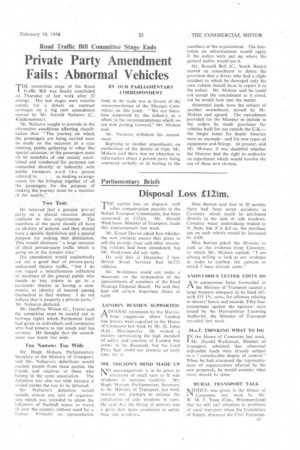Private Party Amendment Fails: Abnormal Vehicles
Page 25

If you've noticed an error in this article please click here to report it so we can fix it.
BY OUR PARLIAMENTARY CORRESPONDENT
THE committee stage of the Road I Traffic Bill was finally concluded on Thursday of last week after 22 sittings. The last stages were notable mainly for a debate on contract carriages on a big new amendment moved by Mr. Gerald Nabarro (C.. K idderminster).
Mr. Nabarro sought to provide in the alternative conditions affecting classification that: "The journey on which the passengers are being carried must be made on the occasion of a race meeting, public gathering or other like special occasion; or the: passengers must all be members, of one society established and conducted for purposes not connected directly; or indirectly with public transport, and the person referred to . . . as Making arrangements for the bringing together of all the passengers for . the • purpose of making the journey muttbea member of the society.
. Two Testi He belieVed that a genuine private' party on a sitecial occasion should conform to two requirements. The members of the party should all have an identity:of_interest, and they should have a specific destination and a special purpose for seeking that destination. This would eliminate "a large measure of illicit private-party traffic which is going on at the present time."
His amendment would undoubtedly cut out a good deal of private-party unlicensed theatre traffic, " but I do not regard a miscellaneous collection of members of the general public who decide to buy tickets to go to a particular theatre as having a community or identity of interest among themselves in that venture. I do not believe that is properly a private party." Mr. Nabarro declared.
Mr. Geoffrey Wilson (C., Truro) said the committee must be careful not to infringe rights which Parliament itself had given to individuals and companies who had powers to run coach and bus services. He thought that the amendment was much too wide.
Too Narrow: Too Wide
Mr. Hugh Molson, Parliamentary Secretary to the Ministry of Transport, said Mr. Nabarro's definitions would exclude people from these parties, the friends and relatives of those who belong to the same association. The definition was also too wide because it would enable the law to be defeated.
Mr. Nabarro's definition would include almost any sort of organization which was intended to allow the followers of football teams to travel all over the country without need for a
licence. Virtually no -representative
body in the trade was in favour of the recommendation of the Thesiger Committee on this point. "We are therefore supported by the industry as a whole in the recommendations which we are now putting forward," Mr. Molson said.
Mr. Nabarro withdrew his amendment.
Replying to another amendment, on publication of the details of trips, Mr. Molson said there Was no objection to information about a private party being conveyed verbally or in writing to the members of the organization. The limitation on advertisement would apply if the notice were put up where the general public would see it.
Mr. Ronald Bell (C., South Bucks) moved an amendment to delete the provision that a driver who had a slight accident in which he damaged only his own vehicle should have to report it to the police. Mr. Molson said he could not accept the amendment as it stood, but he would look into the matter.
Abnormal loads were the subject of another amendment, moved by Mr. Molson and agreed. The amendment provided for the Minister to include in the orders he made provision for vehicles built for use outside the U.K.the longer buses for South America were an example—and for-new types of equipment and fittings. At present, said Mr. Molson, it was doubtful whether the Minister had the right to authorize an experiment which would involve the use of these new devices.












































